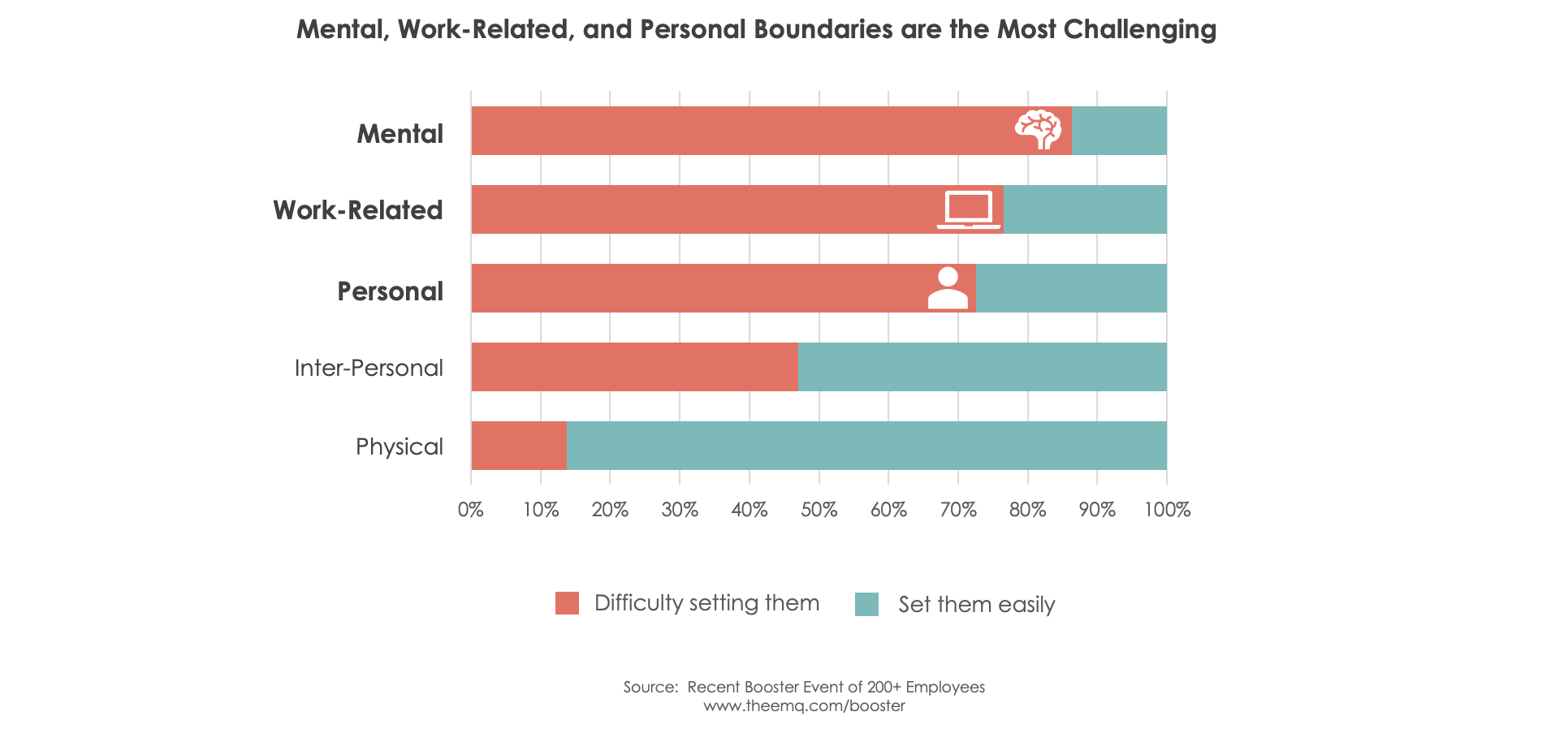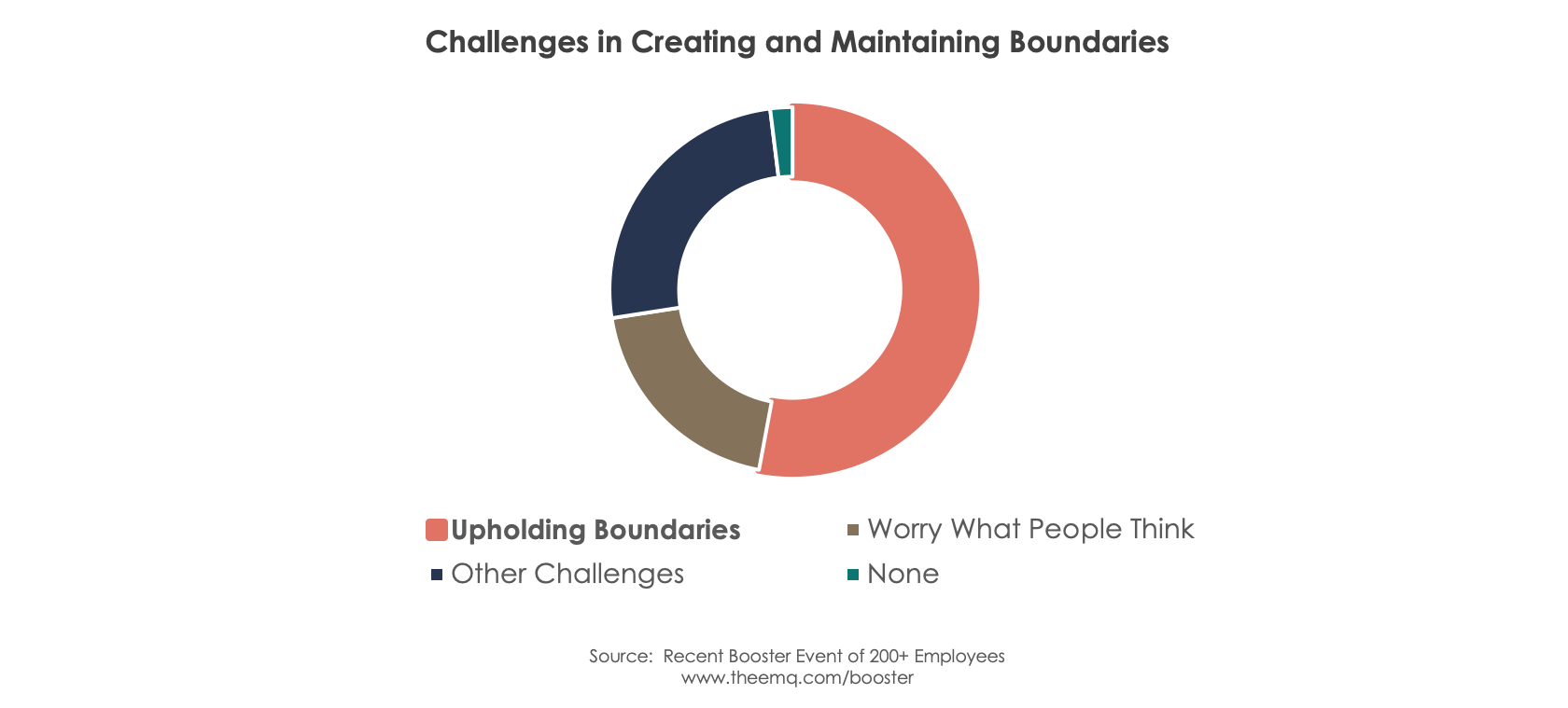Like many, COVID caused us at EffectUX to ask ourselves, how can we use what we have to help people as much, and as fast, as possible? Even before the pandemic we worked in the wellbeing space with our model, myEMQ, a diagnostic and development system that enables people to harness the power of their personal energy by removing core cognitive and behavioral blockers to human excellence. However, asking ourselves how we could best serve people through such a challenging time, sparked ideas to address the clear need for employees to be even more rapidly equipped with strategies and coping skills. This led us to our Energy Boosters, which are quick, virtual sessions, purposefully designed to provide a rapid and sustained learning experience, providing employees techniques and tools to increase their awareness, productivity, and positive mental wellbeing.
While Boosters can be different, depending on the audience, each one sheds light on how employees are doing and what they need. In a recent Booster we explored boundaries. Healthy boundaries are critical to staying positively energized and creating space for all the things that are important in life. I myself have had my own journey with boundaries and have seen the benefit first hand. Now, with even more on our plates, from more to do to stay safe, online schooling, and increased meetings, boundaries can be a great tool to help create more harmony and decrease stress. Here are some of the insights from attendees to help you think about the role of boundaries in your own life, both personally and at work.
1: The majority do not set boundaries well to protect their time and energy for the things that are important to positive wellbeing.
When it comes to having boundaries that focus time and energy across the things that are important, a whopping 82% felt that they do not do this well, or do not do this consistently enough. This includes self-care and relationships.

When we don’t have boundaries, it makes it difficult to create space for the things that really keep us energized and healthy. Our lives get filled up and, before you know it, you haven’t even stopped to eat. If the topic is challenging for you, it can be helpful to see boundaries simply as guidelines, where the context of the situation will play a critical role in how you maintain and communicate them. For example, if you have a guideline that you do not do emails after 8pm, to protect your mental energy before going to bed, but there is a big client deadline and you are waiting for approval to come in by end-of-day, given the context of the situation you may monitor your emails that night, but this behavior would not be your norm. Boundaries, unless they are your core non-negotiables, are not set in stone, but serve as guidance to help you make healthy decisions with the flexibility to adapt given context. With all the stimulus we have today, from emails, to worries, to looking after others, boundaries can also help you limit distractions and noise. Creating boundaries just means you have given thought to what you need to feel valued, respected, and be healthy — emotionally, mentally, physically, and behaviorally.
2: The majority found mental boundaries and setting work-related or personal boundaries most difficult.
There are different types of boundaries, and it is clear that people found some easier to create and uphold than others, with 86% finding mental boundaries the most difficult, closely followed by setting boundaries at work and personally. In contrast, 86% felt they set physical boundaries well.

Mental boundaries are about your personal thought process. How you think about things, and what you give mental space to, is important as it can impact your capacity. When we are always busy, have work on the mind, or dwell on things, it reduces our ability to be present and productive. This can have a knock-on effect on relationships as people may feel you are not paying them attention. It also impacts how well you can direct your focus to optimize performance.
Work-related boundaries are boundaries that define roles, responsibilities and expectations. They also are the boundaries that enable effective work environments. For example, your availability outside of typical work hours. Given there is really no line between work and personal life, now more than ever, it is important to understand what you need to best harmonize across all of your responsibilities in a healthy way.
Other boundaries include:
- Interpersonal boundaries: how people interact and work together. For example, how conflict is resolved.
- Physical boundaries: personal space and which forms of interaction are acceptable.
- Personal boundaries: which behaviors are acceptable, both others and your own, and how you protect your time and energy.
The holiday season, as amazing as it is, can bring added stress and pressure. With an already elevated 2020 stress level due to COVID, it is worth thinking about what you need in order to stay well.
3: Just over half’s biggest challenge with boundaries was upholding them.
When it came to what people found most challenging about boundaries, just over half found most difficulty in upholding them, especially in moments where a situation conflicted with their boundaries. Second, was concern for what people would think.

We find this a very common problem. Often, people feel a form of guilt in setting a boundary. Telling someone you can’t do something can feel uncomfortable, especially if you tend to be a people pleaser. While saying yes is a great thing (when it is to the right things), when you say yes to everything all it leads to is a very busy you — and a state of depleted energy where things fall through the cracks. You only have so much time and energy, so it is important to give yourself permission to set boundaries that protect it for use in meaningful ways.
Fear of someone’s reaction or response if we communicate our boundaries is also something commonly felt. People wonder how they will be seen. For example, if I say I can’t do something, will it impact my chance of progression? Will people think I don’t work hard? Or, if I say my opinion and it differs, will people think I am not collaborative? Or even, if I don’t do this, will this person still like me? Here, the key is to communicate truthfully and respectfully, share your reasoning as it can elevate understanding, and, where possible and plausible focus on possibilities. For example, if someone asks you to do something at 4pm that you want to do for them and you cannot, then what are the options? Could you do it at 3pm or another day?
When it comes to loved ones, it can be especially hard to uphold boundaries, as we are often willing to have more flexibility. However, boundaries are still important here. When we do not set and communicate boundaries that help us maintain and nurture healthy, supportive personal relationships, it can lead to negative feelings about others. We may feel angry, upset, or frustrated with them, when really they may be unaware they have intruded on our boundaries.
The holiday season and new year brings a period of reflection and hope for an even better year to come. And, with the 2020 we had, there is no better time to think about your own boundaries and needs for a happy, healthy, and productive coming year. I’ll leave you with some questions to ask yourself to get started:
- What do I need to feel happy, productive, fulfilled and valued?
- What am I afraid will happen if I create boundaries so that I can be my best self and my needs are addressed? Why do I feel this way?
- If someone intrudes on a boundary (pick a specific one e.g. someone takes credit for your work or speaks to you in an unacceptable way), what will I do? How will I communicate with them? Here, think about the language you are comfortable with, as well as what will resonate with the other person to elevate their understanding.
Setting and maintaining boundaries is an ongoing journey, so it is important to keep learning and improving. Thinking about your boundaries is a good place to start, but it is so important to remain open, as you will experience situations that evoke certain emotions from which you will learn new boundaries. For me, I started with professional boundaries, and as I got more comfortable, I moved into setting better boundaries in my personal life. Personal boundaries are exactly that, personal. Everyone will have their own journey. However, one thing is certain, boundaries will create space for greater fulfillment, capacity, and wellbeing.


